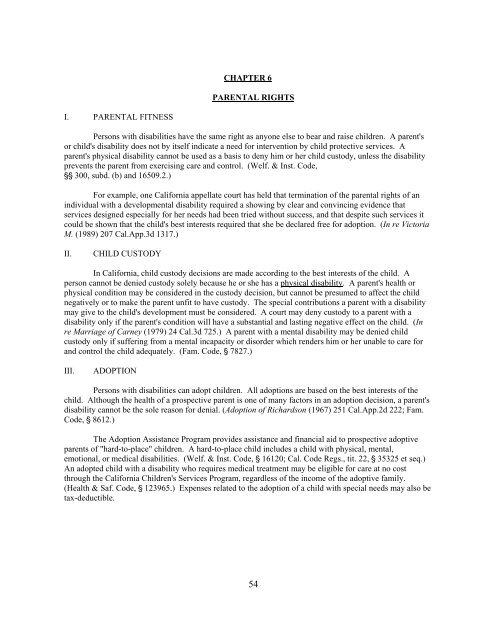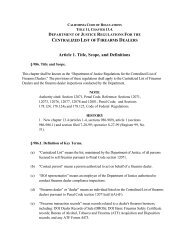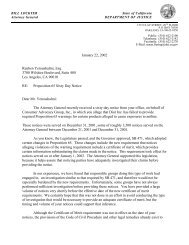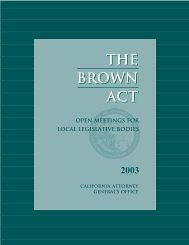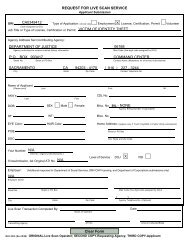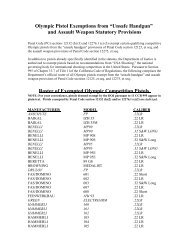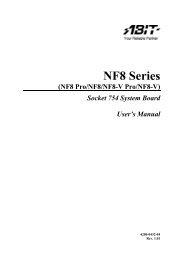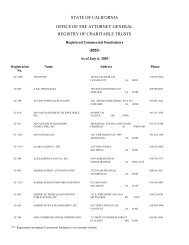Legal Rights of Persons With Disabilities - Ossh.com
Legal Rights of Persons With Disabilities - Ossh.com
Legal Rights of Persons With Disabilities - Ossh.com
Create successful ePaper yourself
Turn your PDF publications into a flip-book with our unique Google optimized e-Paper software.
CHAPTER 6<br />
PARENTAL RIGHTS<br />
I. PARENTAL FITNESS<br />
<strong>Persons</strong> with disabilities have the same right as anyone else to bear and raise children. A parent's<br />
or child's disability does not by itself indicate a need for intervention by child protective services. A<br />
parent's physical disability cannot be used as a basis to deny him or her child custody, unless the disability<br />
prevents the parent from exercising care and control. (Welf. & Inst. Code,<br />
'' 300, subd. (b) and 16509.2.)<br />
For example, one California appellate court has held that termination <strong>of</strong> the parental rights <strong>of</strong> an<br />
individual with a developmental disability required a showing by clear and convincing evidence that<br />
services designed especially for her needs had been tried without success, and that despite such services it<br />
could be shown that the child's best interests required that she be declared free for adoption. (In re Victoria<br />
M. (1989) 207 Cal.App.3d 1317.)<br />
II.<br />
CHILD CUSTODY<br />
In California, child custody decisions are made according to the best interests <strong>of</strong> the child. A<br />
person cannot be denied custody solely because he or she has a physical disability. A parent's health or<br />
physical condition may be considered in the custody decision, but cannot be presumed to affect the child<br />
negatively or to make the parent unfit to have custody. The special contributions a parent with a disability<br />
may give to the child's development must be considered. A court may deny custody to a parent with a<br />
disability only if the parent's condition will have a substantial and lasting negative effect on the child. (In<br />
re Marriage <strong>of</strong> Carney (1979) 24 Cal.3d 725.) A parent with a mental disability may be denied child<br />
custody only if suffering from a mental incapacity or disorder which renders him or her unable to care for<br />
and control the child adequately. (Fam. Code, ' 7827.)<br />
III.<br />
ADOPTION<br />
<strong>Persons</strong> with disabilities can adopt children. All adoptions are based on the best interests <strong>of</strong> the<br />
child. Although the health <strong>of</strong> a prospective parent is one <strong>of</strong> many factors in an adoption decision, a parent's<br />
disability cannot be the sole reason for denial. (Adoption <strong>of</strong> Richardson (1967) 251 Cal.App.2d 222; Fam.<br />
Code, ' 8612.)<br />
The Adoption Assistance Program provides assistance and financial aid to prospective adoptive<br />
parents <strong>of</strong> "hard-to-place" children. A hard-to-place child includes a child with physical, mental,<br />
emotional, or medical disabilities. (Welf. & Inst. Code, ' 16120; Cal. Code Regs., tit. 22, ' 35325 et seq.)<br />
An adopted child with a disability who requires medical treatment may be eligible for care at no cost<br />
through the California Children's Services Program, regardless <strong>of</strong> the in<strong>com</strong>e <strong>of</strong> the adoptive family.<br />
(Health & Saf. Code, ' 123965.) Expenses related to the adoption <strong>of</strong> a child with special needs may also be<br />
tax-deductible.<br />
54


